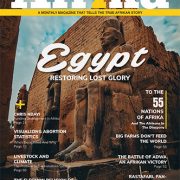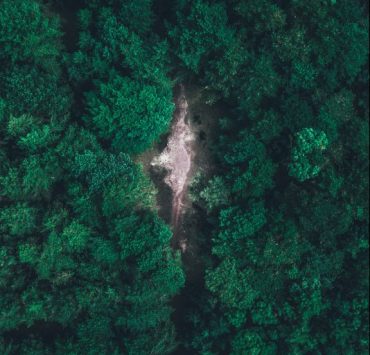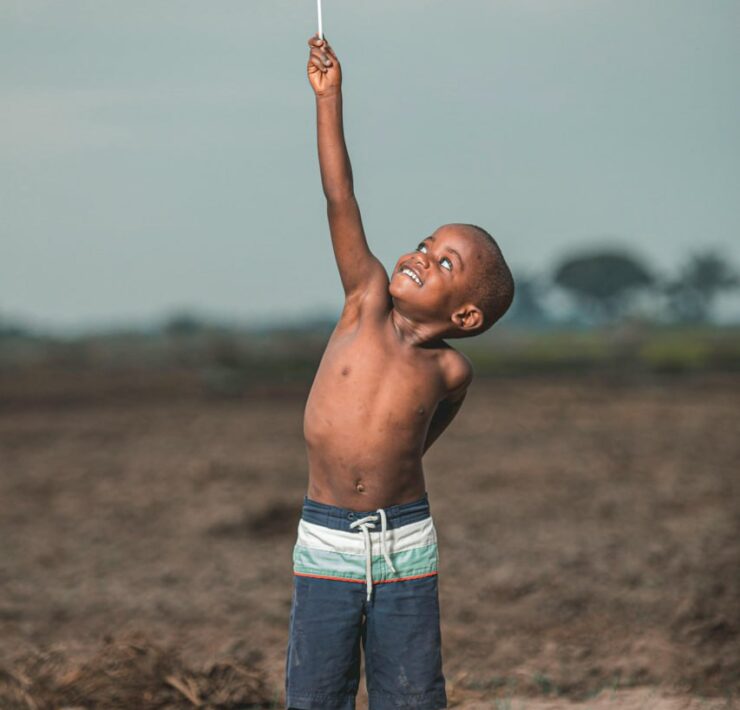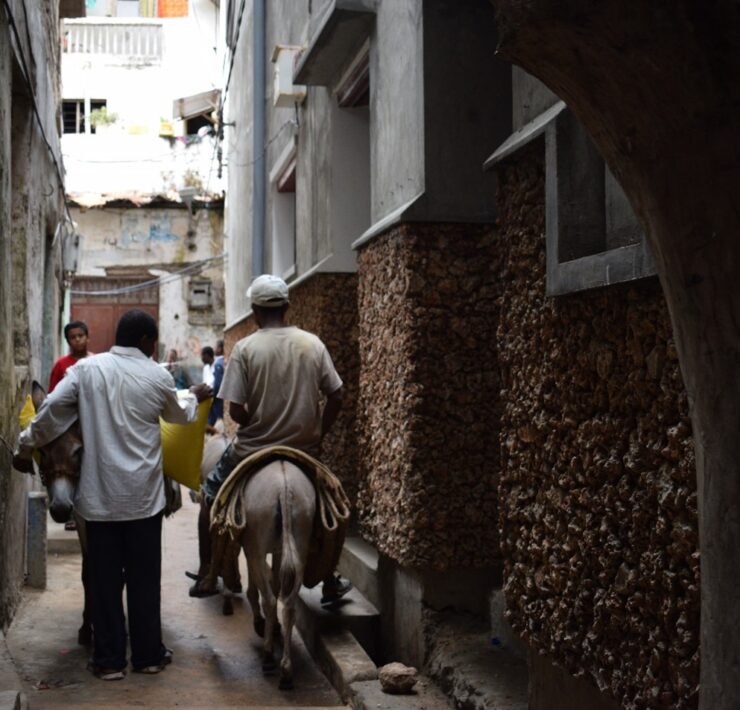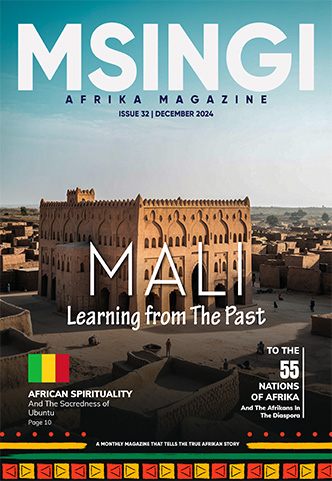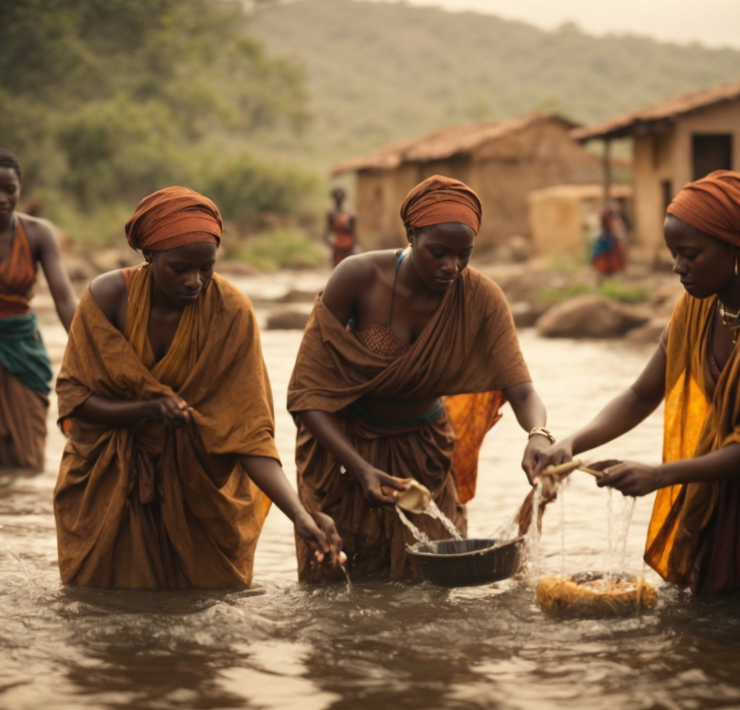
John Igbokoyi is a 4th year engineering student at the…
Nomkhumbi Mkhize is a Canadian-born South African with a Zulu…
Read Next
A Conversation between John Igbokoyi and Khumbi Mkhize
In a room with white walls and white floors, seated on two red chairs, the co-authors of this article contemplated an issue surrounding the focus of people of Afrikan descent. Their contemplation centered around how excess focus on having a good time might be taking away from progress. This was their conversation.
Khumbi, did you know that the idea of the production line credited to Henry Ford, was actually an idea he got from an Afrikan-American man named George Washington Carver. I also found out that the automatic opening and closing of the elevator doors was invented by an Afrikan-American man named Alexander Miles.
Interesting.
Yes. Another interesting fact: Christopher Columbus never discovered America. The claim to that discovery should most likely be given to Malian traders sent by the Musa Malian empire to trade with the American Aboriginals.
Oh really? I did not know that John. That is all very interesting information. Well, did you know the Greek physician, Hippocrates, is crowned in the history books as the father of medicine; but that crown should really go to Imhotep, an Afrikan from Egypt who was born over 2,000 years before Hippocrates himself was even born?
No, I did not know that.
Yes, it is true. And let us not forget our women. In recent history, the Hollywood movie, Hidden Figures, portrays four genius, mathematician Afrikan-American women who were instrumental in NASA’s operations in the 60’s.
I saw that movie, interesting facts. I do believe in our women.
Sticking with women, Patricia Bath, an Afrikan-American woman, in 1981 invented a medical device used for cataract dissolution in the eye, which then cleans the eye and allows for an easy lens replacement. Today this is a common procedure in laser cataract surgery.
See, Khumbi, those facts trouble me today, for certain reasons. The most recent fact I know of is of a young Nigerian man, Silas Adekunle, who created a robot game that caught Apple’s eye. And there are Nigerians in the pharmaceutical industries excelling, but we want to keep this conversation on innovativeness and inventiveness. Aside from that, I am troubled by what seems to be today’s lack of the inventiveness and creativity that seemed to exist in the past. Afrikans have always had the power to dominate the area of progress in innovation and invention. After all, the strongest and wealthiest empire is still the Malian Empire under Emperor Mansa Musa. Now, I say this because it requires this type of empire for a single person to accumulate over $400 billion U.S. dollars…in 2021 and with inflation, probably closer to $500 billion U.S. dollars. Lately, we hardly see such feats and it is troubling.
Why do you think people of Afrikan descent are not exemplifying black excellence like our living elders and ancestors from the past, did? Before you answer that, I will say that we cannot nullify our current works, because there are still some pretty amazing accomplishments of our people like the 13 year old Malawian boy, named William Kamwamba, who became infamous in 2001 for building a wind turbine in his village to provide electrical power used to power a water pump for the irrigation of the village farms. But I guess the question is, where is the innovativeness and inventiveness of the scale at which it was in days past?
I think we of Afrikan descent might be a bit too focused on music, entertainment, and culture that the focus on progress and domineering has been hampered…with help from the media obviously. I am not saying music, entertainment, and culture are bad, I am just saying, we might be too focused on having a good time and not focused enough on nation building.
That is a great point, John. But it has to go deeper than that. We all know Afrikan people are, by far, the most displaced people on earth. Unjust laws, racism, and oppression have all created so much generational trauma that it has forced many of our people to take mental refuge in things they can lay an organic claim to, not so much a corporate claim which would give them control over how the world views it.
Should we as a people allow that correlation though? I say this because certain aspects of what we can say we have taken refuge in have turned out to be, let me say ‘acts’, for a lack of a better word, that have eventually led to shameful displays, and presentations of ourselves to the world, and truth be told to ourselves.
Can you explain that further?
Yes, I can. Let us take the act called twerking that is prevalent in the music industry and Afrikan-American culture today; for our women, it is having a good time. Recently an Afrikan-American lawyer opened up an upscale restaurant in the Atlanta area where a group of black women were cautioned against twerking in his restaurant. After the third caution he had to raise his voice to the whole restaurant. I wonder what the restaurant owner must have been thinking, after pouring his money, sweat, and time into this venture, then to have it be disrespected by a musically sexualized aspect of Afrikan culture. He must have been troubled. Point here, twerking was taken from a traditional Afrikan dance (culture), and used to sexualize our women, by the entertainment industry, making Afrikans as a whole seem less than they actually are, and unfortunately, this act was seamlessly embraced. That is an unacceptable refuge for trauma, would you agree?
I totally agree with you. But we can not avoid the fact that deep rooted generational traumas have caused major post traumatic slave disorders and many times certain behaviors that are directly associated with the weight of those traumas will express themselves in a foul manner.
Yes indeed, as displayed with the men caught up in the gang life, selling drugs as a means to have economic freedom. Let me show you a different perspective, one that takes on an organizational form that can lead to progress.
Okay , let’s hear it.
Khumbi, it takes a business-oriented mindset to operate a drug dealing business. So much so they call it organized crime, made infamous by Hollywood, which is entertainment. Consider the Black Mafia Family. Not a role model I would want for our boys, but what the Flenory brothers did was more than run a drug syndicate, they demonstrated their ability to operate a global corporation wherein their employees (mostly young black men) operated in an organized manner to the success of the corporation. Great set of skills, wrong arena.
Okay, I agree with that point of view. This does show a need to succeed by any means necessary, even if it compromises morality. But, John, what about our women?
Our women have it in them as well. Khumbi, look at my alternative perspective, granted they choose the side of sanity. Sexualizing a person involves the figure of the person, and how the person is clad. As far back as Queen Nefertiti, Queen of Sheba, and other great Afrikan queens like Queen Nzinga were known to be clad in garments and jewels that caught the attention of anyone whose eyes were to fall on them…they were especially known for how they presented themselves. Fashion is an area our Afrikan women have dominated. Granted we have a strong hand in the market, with a bit of sanity and drive towards progress, respect will be seen in how our women can present themselves in a positive light.
So how do you suggest we move forward from here? I think each and everyone of us needs to hold our own selves accountable and responsible for how we can do better not just for our own selves but also for the greater good of our Afrikan race. There are specific steps we all can take to make this happen. Not all of us are going to be on the same pace or on the same page. But we all need to have the same agenda moving forward.
Being on the same agenda will be a hard and nearly impossible thing to do. After all, not all citizens who want glory, sacrifice for it. What I believe needs to happen is the few of us who are already on the progress train should create in such a way that it will inspire. What I believe is lacking, mostly in the global Afrikan community, is inspiration. There seems to be a general lack of motivation towards progress, so much so that it has been replaced with the previously mentioned refuge taken in music, entertainment, and culture…let us call it familiarity. There seems to be a general underlying feeling of helplessness that needs to be overcome with inspiration not in words but in action, more so in completed actions.
John, speaking of completed actions that can motivate, a great inspiration that needs to be mentioned, is of a Gambian carpenter that built the largest estate in Nigeria in Port Harcourt city. His story can be seen on a YouTuber’s channel named Wode Maya. This man has developed his skills as a carpenter from the time he was in high school and today, he employs and mentors hundreds of tradesmen from Nigeria, Gambia, and Senegal.
There you go. I heard about this man…matter of fact I watched the two episodes on Wode Maya’s channel. The man did not go to university; with just the innate desire spawned from inspiration, spent the time necessary to learn, and subsequently built an empire. Come to think about it, who do you think built the pyramids? It is people of Afrikan descent, real Afrikan descent. But that is a story for another time. Point here is, we are, in my opinion, the smartest, most educated (not talking about brick and mortar schooling here), most creative, and most ingenious of all people on this earth. If it’s entertainment we want, Jerry Lawson, an Afrikan-American man is credited for developing the first cartridge based video game console commercially released, Fairchild Channel F. That is an innovative invention for entertainment, but more so an invention that can be tailored towards education.
Now that is innovative and forward thinking for entertainment. I can only imagine if this next generation can take that mindset and gear it towards education in all areas that can allow the Afrikan race to be in a healthy competition with the rest of the world. You want to know the future I would like to see for my son, John?
Yes Khumbi.
I would like to see a world where Afrikan people, in all areas of the world, will be seen and respected as the first people who were and will be the pioneers of many inventions of the past, and future. But we ourselves must first re-educate ourselves as well as our children.
Khumbi, I agree with you on the re-educate point. I sincerely believe that if we were to rethink our educational system, especially to be more Afro-Centric, we will have a better result…a result that is geared towards Afrikan nation building. There is a time and place to have a good time, but we must think of the future.
You know, redesigning our education system would be an excellent solution, a great starting point. Let’s get started.
Yes, let’s get started. That was a great conversation Khumbi.
Yes, yes it was. We should do this again.
Most definitely, maybe next time with inspiration from one of our completed or nearly completed works.
John, that is a great idea. You really have great ideas.
Yes, it’s my thing. This is a great room by the way. Same place next time?
Sounds good to me, till next time…Mr. Great Ideas.
Till next time, mama bear.
Subscribe now for updates from Msingi Afrika Magazine!
Receive notifications about new issues, products and offers.
What's Your Reaction?
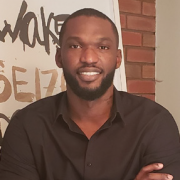 PIN IT
PIN ITJohn Igbokoyi is a 4th year engineering student at the University of Victoria in Canada, where he is majoring in electrical engineering, and minoring in mechanical systems, backed up by courses to strengthen his business acumen. He is involved in the stock market, as well as projects in the aerospace industry, and energy sector. He has spent time studying and understanding applicable knowledge necessary for the sustainable development of the infrastructure and economy of a society, for progress and most importantly socio-economic benefits. He believes that one must at all costs pursue that which they believe they are destined to do; with dedication, focus, and commitment, and the relentless pursuit of all that is good, anything is possible.
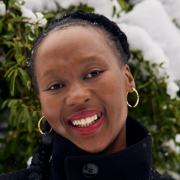 PIN IT
PIN ITNomkhumbi Mkhize is a Canadian-born South African with a Zulu background. While studying to be an herbalist for over ten years, she became a certified medicinal herb farmer in 2020. She has achieved her certificate as a Doula with the Nesting Doula Collective specialising in BIPOC women and babies. She is now studying to be an acupuncturist with the desire and intention of creating a holistic healing clinic in the future. In conjunction with her current skills and experiences, she plans to bring health and wellness to her community. She is currently residing in Victoria, British Columbia Canada with her son.









